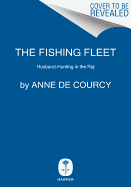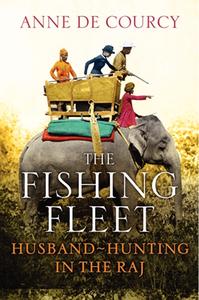
 Anne de Courcy is a tireless researcher into the lives and times of English people and places. In The Fishing Fleet, she takes on the Raj--a period lasting from 1858, when the rule of the British East India Company was transferred to the crown, until 1947. During that time, women, some as young as 16, were packed off to India because, as de Courcy explains, "the plight of the gently born, softly brought up middle-class woman, in particular, exercised both the Government and the popular imagination: because of her class, most forms of labour were 'banned'; because of her lack of education she was ill-equipped to support herself; because of her lack of independence she could not, like her brothers, seek her fortune overseas--and because so many of her brothers did, her pool of potential husbands was correspondingly smaller." The alternative was eternal spinsterhood as a governess, a "companion" to wealthy older women, or some other form of domestic service.
Anne de Courcy is a tireless researcher into the lives and times of English people and places. In The Fishing Fleet, she takes on the Raj--a period lasting from 1858, when the rule of the British East India Company was transferred to the crown, until 1947. During that time, women, some as young as 16, were packed off to India because, as de Courcy explains, "the plight of the gently born, softly brought up middle-class woman, in particular, exercised both the Government and the popular imagination: because of her class, most forms of labour were 'banned'; because of her lack of education she was ill-equipped to support herself; because of her lack of independence she could not, like her brothers, seek her fortune overseas--and because so many of her brothers did, her pool of potential husbands was correspondingly smaller." The alternative was eternal spinsterhood as a governess, a "companion" to wealthy older women, or some other form of domestic service.
De Courcy (The Viceroy's Daughters) had access to reams of information in the form of letters, memoirs and diaries, in addition to a comprehensive bibliography of all matters Raj. This embarrassment of riches at times threatens to overwhelm her narrative, which can get repetitive when it comes to the ball gowns the young women brought with them, the parties they attended, the tennis, the golf.... The most compelling parts of The Fishing Fleet focus on the trip out and the anecdotal reminiscences. The ships were small, the weather mostly bad, the journey about four months long, with dismal accommodations. Nevertheless, waves of women continued to arrive in India, where the ratio of men to women was 4 to 1, and were immediately caught up in a swirl of courtship. If a girl wanted a husband, she could find one, or he would find her. If the man was in a hurry to get back to his plantation, an acquaintance might lead to a proposal in less than two weeks.
Then, the miseries really began. Wives were often stuck in isolated outposts with the nearest woman five miles away. Disease was rampant, sometimes striking in the morning and causing death by evening. Despite all, these stalwart English girls stuck it out and came to love India. Perhaps this is one of the reasons there will always be an England. --Valerie Ryan
Shelf Talker: Anne De Courcy draws upon the diaries and memoirs of decades' worth of single women who left England to find their mates among the surplus of single men in India.

